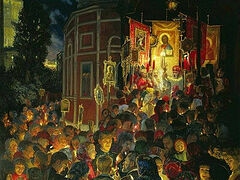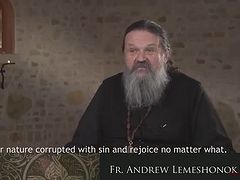Pascha is the most important Christian feast. The preparation for it lasts over forty days. How can we hold onto the joy of this genuine meeting with Christ? How can we understand that this meeting has taken place? Why is it better to refrain from traveling to cemeteries during Bright Week? Archpriest Alexander Berezovsky, cleric of the Church of the Annunciation of the Most Holy Theotokos in Petrovsky Park in Moscow, answers these and other questions for the Moscow Sretensky Monastery website.
—Father Alexander, the Church is celebrating the most important Christian feast. These days even have a special name. Why is do we call the week after Pascha, Bright Week?
—Christ came down from Heaven and became perfect Man. Yet He remained perfect God. This means that He became physically incarnated of the Most Holy Theotokos, but at the same time He did not break off the Heavenly relationship with His Heavenly Father. He remained the Second Person of the Most Holy Trinity. The Lord came to earth to save us from sin and eternal death. The Way of the Cross and the Passion of our Lord Jesus Christ are behind us. For the whole week we were commemorating the ascent of Christ to Golgotha for our salvation. The Savior endured for us what every human being would have had to endure for his sins. And today is the day of the Radiant Resurrection of Christ. Why Radiant? Because it is the victory of Christ over the devil. This is the victory of light over darkness. This is the victory of truth over falsehood. That is why that week is called Bright Week. Due to his sins, man plunged into pitch darkness. But only Christ can bring any person out of this darkness and give him light. When we partake of the Holy Mysteries of Christ, we feel the presence of this light in this marvelous sacrament. And now that the Lord is Risen, Heaven is open to all mankind. Now we can see the angels, the Most Holy Theotokos, our Lord Jesus Christ, and God the Father through this faith. We believe that death has been conquered, defeated by Christ’s death on the Cross. He Himself said this to His disciples: Be of good cheer; I have overcome the world (Jn. 16:33). Although He was speaking about the world, the world is a synonym for mortal sins and death itself. So, God grants everyone this amazing happiness—to rise with Christ. This is the happiest feast of the year, for we are resurrected together with Christ for eternal life.
—Great Lent, the most difficult season in terms of abstaining from excesses, has passed. What next? Can we relax?
—That’s the point: not to relax, not to lose what we have acquired. After all, now all the restrictions are removed: we can eat any kinds of food and allow ourselves to rest. And then relaxation comes. It happens that people during Bright Week lose everything that they gained with such difficulty throughout Great Lent. But we must succeed in multiplying God’s grace in us. It should be done through prayer, reading the Holy Scriptures, good works for the sake of Christ and the sacraments. We shouldn’t relax. If we limit ourselves just to consuming Lenten food, we will have nothing in common with Christ.
—After all, you can’t be faithful to Christ only on certain specific days. What about the other days? You can’t be a Christian in the fasting periods alone.
—Striving for Christ must be unceasing and permanent.
—These days many people talk about Paschal joy. Are there any criteria for determining this joy? Or is it always a personal and very subjective experience?
—Everyone experiences this joy in their own way. It all depends on various factors: on one’s faith, on expectations. Another thing is that some people expect specific earthly gifts from God. And if they receive them, they give thanks and rejoice, and if they don’t, they are upset and sometimes even discouraged. Someone waits for a sumptuous meal at Pascha. But someone else meets this day differently. For some it is more important to be in church more often on Bright Week. Some even try not to miss a single service during this week in order to glorify the Risen Christ. Such people continue to observe certain strict rules. True, Lent is over, but one continues to deprive himself in some way. And this is right! If a person lives at least one day without any limitations, this very day can be the beginning of a great fall. Why would we need it?! Therefore, the joy of every individual person is different. Someone rejoices that Christ is Risen, and someone else rejoices in the approaching sunny days, the onset of summer or his upcoming vacation. Joy can be both mental and spiritual.
—Father Alexander, what about those who failed to bear the spiritual fruit of fasting? What to do if Lent has passed by, although initially there was a desire to fast?
—Nothing prevents you from changing your life after the fast. If you wanted to abstain from something, start abstaining. Is it sinful for you to abstain from something harmful? From harmful food, words, thoughts and deeds? On what day of the year is it forbidden for us to put restrictions on ourselves? There is no such day in our calendar. Therefore, it is good if on the day of Christ’s Resurrection we put limits on unnecessary words we say, idleness, expressing our unkind feelings, or maybe good ones, but expressed too emotionally. So get started! Only start today, not tomorrow, because tomorrow you definitely won’t begin; so it’s better to do it right away. It’s never too late to start changing something in yourself. To be more friendly with people, more restrained and more patient with your life circumstances. For example, if some trouble has befallen you today, try to react wisely. Don’t get indignant and don’t tell everyone about it. No one will know anything about how unfairly you were treated, and no one’s mood will be spoiled. And do so every day until the Lord calls you to eternal life.
—Every year the Church says that it is better to refrain from traveling to cemeteries on Pascha. What do you usually say to your parishioners if someone has the desire to visit the grave of his loved one?
—The Church established the first day of commemoration of the departed after Pascha. This is Radonitsa, which is celebrated on Tuesday of the second week after Pascha. We rejoice on this day together with our departed relatives. And on Pascha itself it would be good to attend the church service and get together as a family. If you have relatives who due to their health issues can’t come to church, it would be good to go and visit them, sharing this joy with them. You can give them blessed kulichi (Paschal cakes) and Paschal eggs. Why did many Soviet people go to the cemetery on Pascha? Because most churches were closed, and the human soul requires something special. People were not very experienced in prayer, but their souls longed for something. Visiting cemeteries was a kind of religious act. Many would take food with them and arrange a meal there, while cleaning their loved ones’ gravestones. At such moments people feel unity with their departed relatives. But if they died, they are no more! Why then go to the cemetery? Why eat home-cooked food on your knees if you can have lunch in your dining-room peacefully? By this, people who are not very religious testify to eternal life. People feel it subconsciously.
I know some people who take time off work for part of Holy Week and part of Bright Week in order to spend more time in this joy. This is such a wonderful manifestation of their love for God.
—What if an anniversary of someone’s loved one’s repose fell on Pascha? Is it allowed to go to the cemetery on such a day?
—In the morning go to the service, and then to the cemetery if the anniversary really falls on this day. Pascha must be celebrated in church. You can go to the cemetery if you really want to.
—You said that it is important to strive for Christ continually. But what if you go to church every Sunday, and yet there are no changes? What is it: striving or profanation?
—I don’t know. I can’t judge people. Because everyone has his own motives for his actions. I really hope that if on Sunday, on their day off, people get up early and come (some from afar) to church, then it isn’t profanation. I hope that it is not just a custom, but a genuine aspiration, behind which there is an expectation.
—A few years ago, I came to the Paschal service. And I hadn’t observed Lent at all—it just had passed by. But at the end of the service the priest gave me a chocolate bar. I experienced some unprecedented joy and happiness. Not because I had received a chocolate, but for some other reason. I had come just to stand at the service without expecting any joy.
—What’s paradoxical about that? Have you ever read the Paschal Homily of St. John Chrysostom?
—He wrote that it doesn’t matter at what time you came...
—So, the Lord gives to everyone who comes so that he can remember where and under what circumstances he received grace and want to experience these feelings again in his life. In fact, the Lord wants all of us to partake of this joy forever. But unfortunately, we can contain it for a very short time. Paschal joy leaves us, but the memory of it remains. Look how much time has passed, but you still remember... And if you want to experience this joy again, you already know where to go and what to do.
 —Father Alexander, prison chaplains or pastors who serve at hospices or other medical institutions cannot always be with their flocks on Paschal night. How can such people participate in the Radiant Resurrection of Christ?
—Father Alexander, prison chaplains or pastors who serve at hospices or other medical institutions cannot always be with their flocks on Paschal night. How can such people participate in the Radiant Resurrection of Christ?
—Now there is usually either a church or a prayer room in all institutions. The room is equipped as a chapel. And on Bright Week a priest is obliged to perform a service there. He greets, hears confessions and gives Communion to those who need it. Now we (quite educated and selfless people who pastor such institutions) have enough strength to give Communion to everyone. The only problem is the people themselves. If there is a desire, the Lord will surely provide such an opportunity.
—Do you remember the most remarkable Pascha in your ministry?
—I don’t remember what year it was, but it was the time when people were beginning to go to church in Russia. There were very few active churches then, and all of them were packed. There were few priests. Fr. Dimitry Smirnov and I served together. I think we gave Communion to 800 people then. This is what I remember. I put the chalice on the altar table, but I couldn’t unbend my fingers. Holy Communion lasted for an hour and a half. And people kept coming up to the chalice... Patiently. It was awesome. The night service; everyone was tired; fasting was over, but the people remained. And there was such joy on the faces of all who communed. And this joy gave strength. I remember that when I came onto the ambo, I was spellbound by the vast concourse of people. Every priest is so happy to see everyone who comes to church! Even if he still knows nothing or very little... The most important thing is that he came. Come, don’t be afraid! The Lord is waiting for each one of you!






